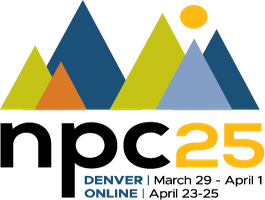Denver, Colorado | March 29–April 1, 2025
Online | April 23-25, 2025
NPC25 Call for Proposals
Are you passionate about shaping the future of planning? Do you have insights and ideas to share on pressing topics such as climate change, housing, health equity, and the future of planning? We invite you to submit your proposal to become a speaker at the upcoming NPC25 Conference.
We are seeking engaging and thought-provoking sessions that delve into the complexities of climate change, housing, health equity, and the future of planning. If you have groundbreaking research, innovative solutions, or inspiring case studies related to these areas, we encourage you to submit your proposal.
Submitting a proposal for the National Planning Conference offers you the exciting opportunity to present your insights and expertise either in person in Denver or at our Online Conference.
Guide to Submitting a Strong Proposal
Peer Review Volunteer Opportunity
Not sure if you will be able to travel to Denver?
If you prefer or need the flexibility of presenting at the NPC25 Online Conference you can select this option during the submission process. NPC25 Online is also a fantastic platform to share your knowledge with a global audience. Whether in person or online, your contribution will make a significant impact.
If presenting isn't an option for you or if you're short on time to put together a complete proposal, you can still make a valuable contribution by signing up to peer review submitted proposals. As a peer reviewer, you'll help shape the conference from behind the scenes by ensuring high-quality sessions that align with current trends and needs in the field. Plus, you'll receive CM credit for your pro bono service, acknowledging your expertise and dedication. Join us in creating an outstanding conference experience by sharing your insights and knowledge in this essential role.
Why Participate?
Share your expertise: Present your insights and experience with a diverse audience of professionals in the planning community.
Make an impact: Contribute to the collective knowledge and understanding of key issues in planning and help shape the field's future.
Network and collaborate: Connect with like-minded professionals, exchange ideas, and forge valuable partnerships.
Raise your profile: Establish yourself as a thought leader and gain recognition for your contributions within the planning industry.
- Sign up to review proposals: August 21, 2024
- Submit a proposal: August 21, 2024
Other Important Dates to Know
| Proposal submission preparation | July 10-July 31, 2024 |
| Proposal submission portal window open | July 31-August 21, 2024 |
| Proposals Peer review | August 30-September 13, 2024 |
| Program curation | October- December 2024 |
| Notification of session acceptance | January 2025 |
| Registration opens | January 2025 |
Submission Guidelines
Proposals are welcomed in a variety of formats, including presentations, panel discussions, workshops, and interactive sessions.
Ensure your proposal aligns with at least one of the following focus areas:
- Climate Change, Energy, and the Environment
- Economic Trends and Transformations
- Emerging and Evolving Technology
- Inclusive Planning for Social Change
- Housing Challenges and Solutions
- Navigating Politics to Advance Planning
- Transportation and Infrastructure
- Upskilling for the Future
NPC25 Session Formats
Lightning Talk
Share your success story or new idea in a Lightning Talk. Various 5-minute presentations will be grouped together with each speaker introducing their innovative insights clearly and insightfully.
Delivery options: In-person only
Length: 5 minutes
Presenter Maximum: 1
Innovation Talk
Help planners innovate by presenting on a trending topic or sharing an example of an agile approach used to tackle the changing environment. Demonstrate a novel method, tool, or lesson learned, and provide practical application tips for planners to overcome challenges today, tomorrow, and in the future.
Delivery options: In-person only
Length: 15 minutes
Presenter Maximum: 1
Open Fishbowl
Invite attendees to join the discussion! Host a small group discussion or debate with open chairs for audience members to cycle in/out of the discussion.
Delivery options: In-person only
Length: 45 minutes
Presenter Maximum: 2
Standard Slide Presentation
Explore, analyze, summarize, or challenge planning projects that address a problem or seize an opportunity. Take the audience on a journey from idea conception to lessons learned, including practical application methods, tools, and novel approaches. The audience should leave with knowledge of how to apply the discussed tools and solutions to their work. Sessions in this format should consist of audio/visual presentations lasting at least 40 minutes.
Delivery options: In-person or online
Length: 45 minutes
Presenter Maximum: 3
Panel Discussion
A discussion amongst panelists with diverse backgrounds, viewpoints, and organizations about a central topic. The audience should be engaged throughout the discussion and time should be reserved for Q&A.
Delivery options: In-person or online
Length: 45-minutes
Presenter Maximum: 4
AICP Mandatory Credit
AICP has designated four mandatory topics as a requirement of AICP-certified planners. These credits are fundamental to how planning is practiced today. Choose from the Law, Ethics, Equity, and Sustainability and Resilience. To be considered for NPC, proposals must effectively detail how the presentation will meet the CM criteria established for that topic.
Delivery options: In-person or online
Presentation Length: 60-minutes
Panel Maximum: 4
Learning Lab
These collaborative sessions are designed to generate ideas, plan strategies, and identify potential solutions to address specific challenges or opportunities. These are not intended for attendees to attend a slide-heavy 90-minute presentation, but for them to be engaged via a mix of a brief presentation, facilitation, and problem-solving group exercises. Handouts, collaborative breakouts, group exercises, and/or other hands-on activities are required.
Delivery options: In-person only
Presentation length: 90-minutes
Panel Maximum: 5
How to Submit:
We look forward to reviewing your submission and potentially showcasing your expertise at the NPC25 Conference!
Join us at the NPC25 Conference as we tackle pressing issues, exchange knowledge, and explore the future of planning. Your insights and contributions are essential in shaping a sustainable and equitable future for our communities.
For any inquiries or further information, please contact proposals@planning.org.

